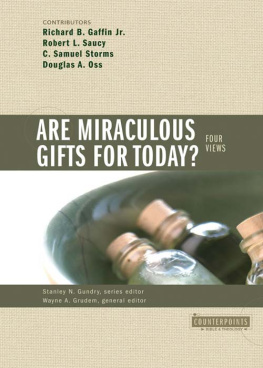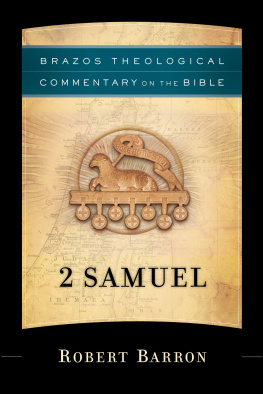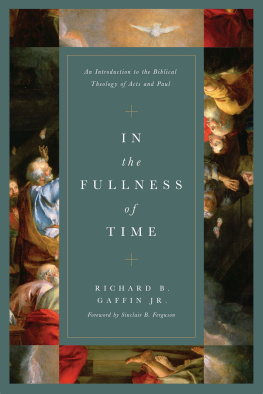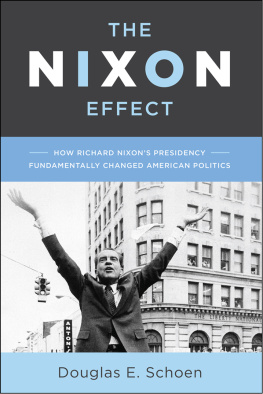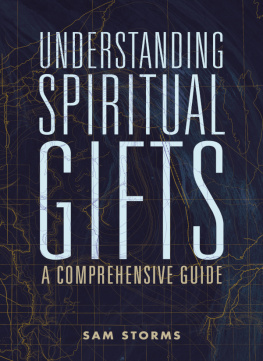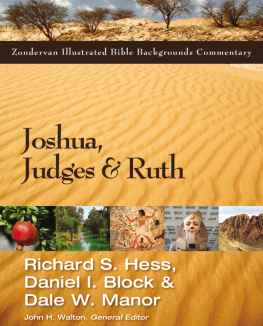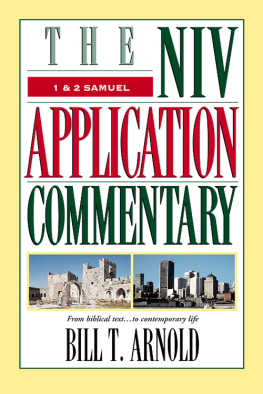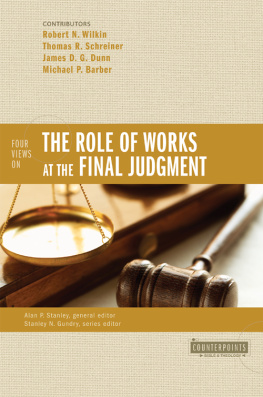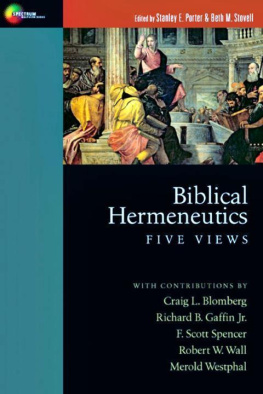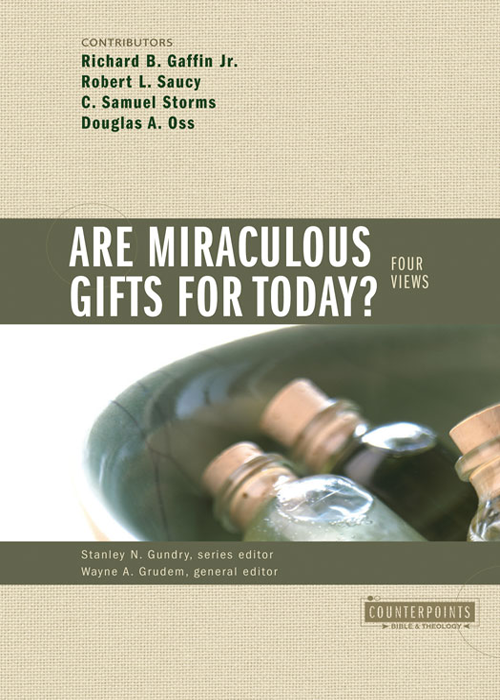ARE MIRACULOUS GIFTS
FOR TODAY?
4 VIEWS
Richard B. Gaffin Jr.
Robert L. Saucy
C. Samuel Storms
Douglas A. Oss
Stanley N. Gundry series editor
Wayne A. Grudem general editor

With much appreciation and affection
we dedicate this book
to our wives
Jean Gaffin
Margaret Grudem
Debra Oss
Nancy Saucy
Ann Storms
CONTENTS
How is the Holy Spirit working in churches today? Is he really giving miraculous healings and prophecies and messages in tongues? Is he giving Christians new power for ministry when they experience a baptism in the Holy Spirit after conversion? Is he driving out demons when Christians command them to flee?
Or are these events confined to the distant past, to the time when the New Testament was being written and living apostles taught and governedand worked miraclesin the churches?
There is little consensus on these questions among evangelical Christians today. There are many Pentecostals who say that Christians should seek to be baptized in the Holy Spirit after conversion, and that this experience will result in new spiritual power for ministry. But other evangelicals respond that they already have been baptized in the Holy Spirit, because it happened the moment they became Christians. Who is right? What are the arguments on each side?
In addition to these questions, there are many differences over specific spiritual gifts. Can people have a gift of prophecy today, so that God actually reveals things to them and they can tell these revelations to others? Or was that gift confined to the time when the New Testament was still unfinished, in the first century A.D.? And what about healing? Should Christians expect that God will often heal in miraculous ways when they pray today? Can some people still have a gift of healing? Or should our prayer emphasis be that God will work to heal through ordinary means, such as doctors and medicine? Or again, should we mostly encourage people to see the sanctifying value of sickness and pray that they will have grace to endure it?
There is even less consensus on the gift of speaking in tongues. Some Christians say that it is a valuable help to their prayer life, others say it is a sign of being baptized in the Holy Spirit, and still others say it does not exist today because it is a form of verbal revelation from God that ended when the New Testament writings were completed.
We could go on with more questionsquestions about whether the Holy Spirit guides us today through feelings and impressions of his will, about casting out demons, and about seeking spiritual gifts, or questions about claims that evangelism today should be accompanied by demonstrations of Gods miraculous power. But the point should already be clear: This is a large and interesting area of discussion, one of immense importance to the life of the church today.
THE FOUR POSITIONS
Is there any way forward from this array of questions and different views? The first step should be to define clearly what the main positions are that are currently held in the evangelical world. If this book succeeds only in that task, something valuable will have been achieved.
But what are the main positions? Can the entire evangelical world be classified into four positions on these questions? As I discussed this matter with editors Stan Gundry and Jack Kuhatschek at Zondervan Publishing House, some positions became immediately clear.
The cessationist position argues that there are no miraculous gifts of the Holy Spirit today. Gifts such as prophecy, tongues, and healing were confined to the first century, and were used at the time the apostles were establishing the churches and the New Testament was not yet complete. This is a well-defined and often-defended position within evangelical scholarship.
There are cessationists within both the Reformed and the dispensational segments of evangelicalism. Reformed cessationism is represented by many of the faculty at Westminster Seminary, especially Richard Gaffin. Dispensational cessationists hold similar positions on this question but are in different institutions; they are represented by institutions such as Dallas Seminary and The Masters Seminary. Within the Lutheran tradition, conservative groups such as the Missouri Synod also hold mostly to a cessationist position.
Standing in clear opposition to the cessationist position are three groups that encourage the use of all spiritual gifts today: Pentecostals, charismatics, and the Third Wave. Although sometimes people have used the terms Pentecostal and charismatic indiscriminately to refer to all of these groups, the terms are more accurately understood in the following way:
Pentecostal refers to any denomination or group that traces its historical origin back to the Pentecostal revival that began in the United States in 1901, and that holds the following doctrines: (1) All the gifts of the Holy Spirit mentioned in the New Testament are intended for today; (2) baptism in the Holy Spirit is an empowering experience subsequent to conversion and should be sought by Christians today; and (3) when baptism in the Holy Spirit occurs, people will speak in tongues as a sign that they have received this experience. Pentecostal groups usually have their own distinct denominational structures, among which are the Assemblies of God, the Church of God in Christ, and many others.
Charismatic, on the other hand, refers to any groups (or people) that trace their historical origin to the charismatic renewal movement of the 1960s and 1970s and that seek to practice all the spiritual gifts mentioned in the New Testament (including prophecy, healing, miracles, tongues, interpretation, and distinguishing between spirits). Among charismatics there are differing viewpoints on whether baptism in the Holy Spirit is subsequent to conversion and whether speaking in tongues is a sign of baptism in the Spirit. Charismatics by and large have refrained from forming their own denominations, but view themselves as a force for renewal within existing Protestant and Roman Catholic churches. There is no representative charismatic denomination in the United States today, but the most prominent charismatic spokesman is probably Pat Robertson with his Christian Broadcasting Network, the television program The 700 Club, and Regent University (formerly CBN University).
In the 1980s a third renewal movement arose, a movement called The Third Wave by missions professor C. Peter Wagner at Fuller Seminary (he referred to the Pentecostal renewal as the first wave of the Holy Spirits renewing work in the modern
Those are the well-defined positions: cessationist, Pentecostal, charismatic, Third Wave. But these hardly represent the entire evangelical world. There is yet another position, held by a vast number of evangelicals who think of themselves as belonging to none of these groups. These people have not been convinced by the cessationist arguments that relegate certain gifts to the first century, but they are not really convinced by the doctrine or practice of those who emphasize such gifts today either. They are open to the possibility of miraculous gifts today, but they are concerned about the possibility of abuses that they have seen in groups that practice these gifts. They do not think speaking in tongues is ruled out by Scripture, but they see many modern examples as not conforming to scriptural guidelines; some also are concerned that it often leads to divisiveness and negative results in churches today. They think churches should emphasize evangelism, Bible study, and faithful obedience as keys to personal and church growth, rather than miraculous gifts. Yet they appreciate some of the benefits that Pentecostal, charismatic, and Third Wave churches have brought to the evangelical world, especially a refreshing contemporary tone in worship and a challenge to renewal in faith and prayer.

